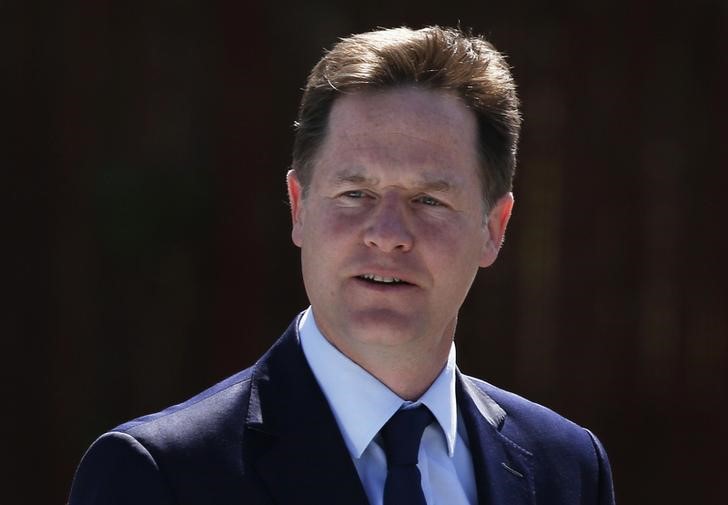LONDON (Reuters) - The Liberal Democrats, Britain's most enthusiastic Europhiles, kicked off the fight to stay in the European Union on Monday with a warning that their rivals are dangerously ambivalent about the consequences of leaving.
Nick Clegg, the former party leader and coalition partner of Prime Minister David Cameron in the last government, said the stakes "could not be higher", with a "Brexit" potentially leading to a break-up of the United Kingdom.
Britons will vote on the country's future in the 28-member bloc before the end of 2017 in a referendum Cameron promised before last May's election to try to counter the rise of the anti-EU UK Independence Party.
Clegg, one of only eight LibDem lawmakers remaining after the election from 57 in the last parliament, said both Cameron and new opposition leader Jeremy Corbyn needed to get stuck into the campaign, as the stakes could not be higher in terms of the unity of Britain and the country's position on the world stage.
He said a vote to leave would isolate Britain and the fallout would jeopardise the United Kingdom itself.
"I am absolutely convinced that if we were to leave the European Union, Scotland would shortly thereafter vote to leave what remains of the United Kingdom," he told BBC radio.
Warning that the referendum could be close-run, he said Cameron, as the cause of the vote, needed to do more.
"The one individual in British politics who will have to play the biggest role of all to win the referendum is David Cameron," he said.
"It is his referendum, he's put it to the country, as we all know. The origins of it are his weakness within the Conservative Party."
The LibDems previously could have counted on the Labour Party to back the EU. But Clegg said the election of left-winger Corbyn as Labour leader this month has muddied the waters.
"I say to Jeremy Corbyn: the EU referendum is simply too important for ambivalence," he told party delegates.
Corbyn, who voted "No" to Britain's membership of the forerunner to the European Union in a 1975 election, said last week he could not give Cameron a "blank cheque" to renegotiate EU ties ahead of the vote.
He shifted his position days later, saying Labour believed Britain should remain in the EU. But if Cameron failed to deliver a "good package or one that reduces the social gains we have previously won in Europe", he said, the party would renegotiate.
